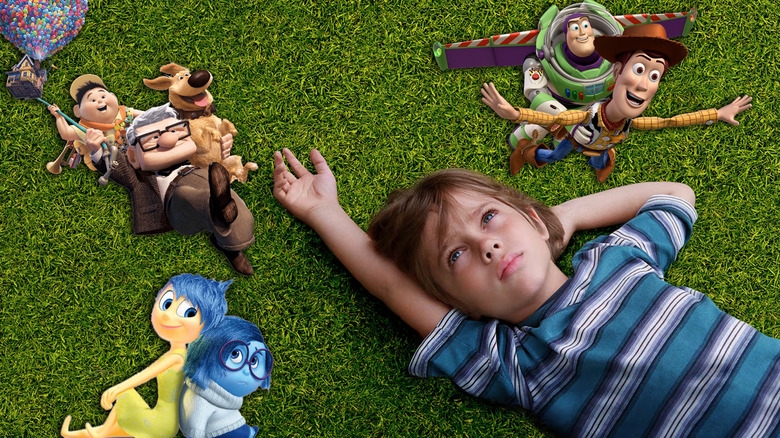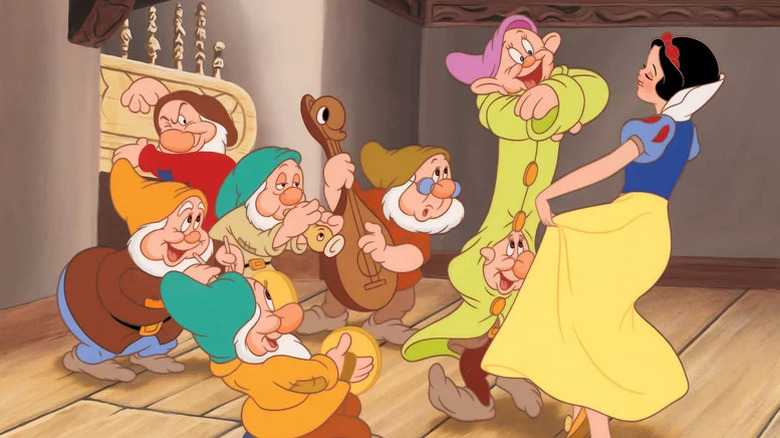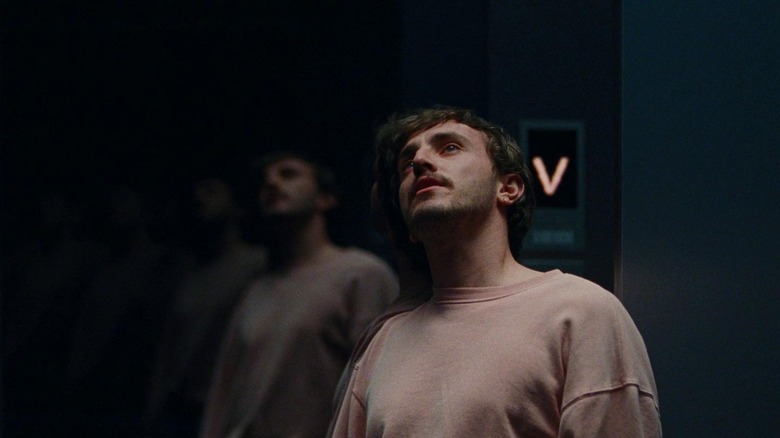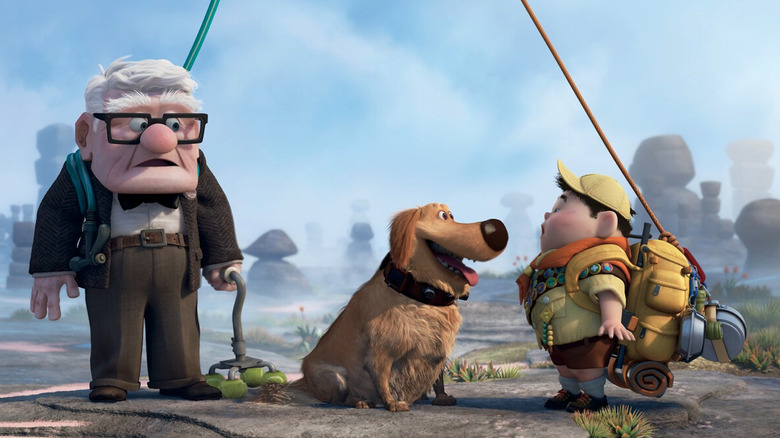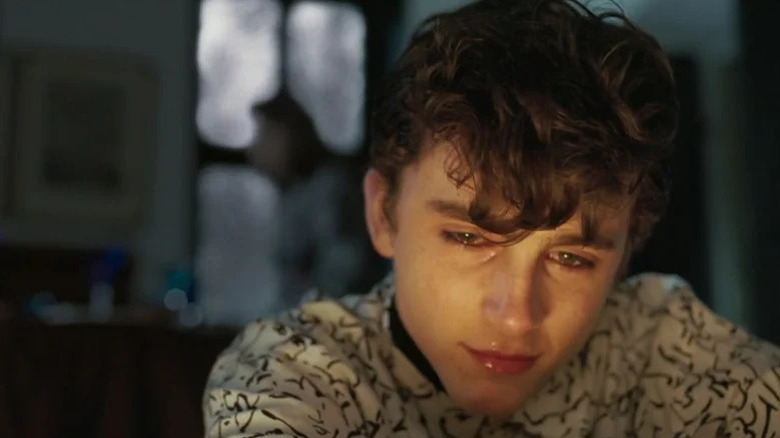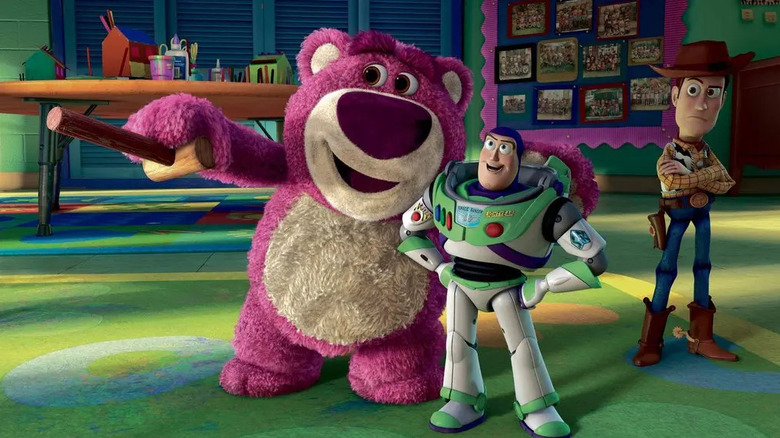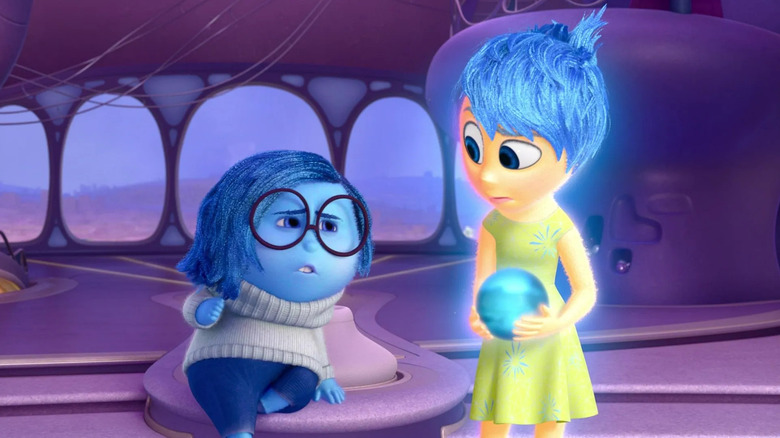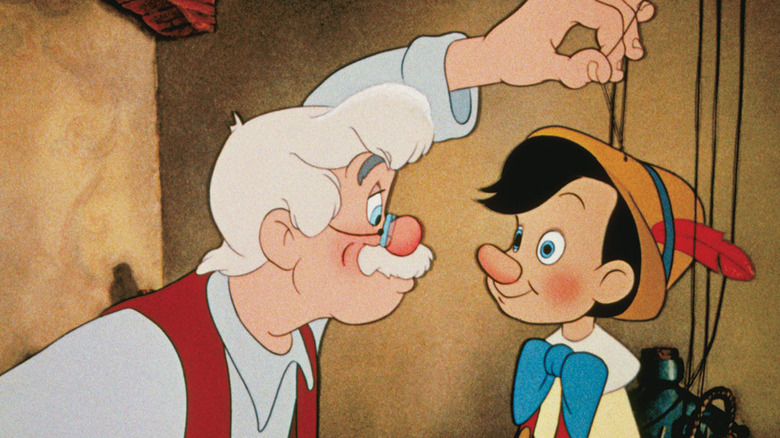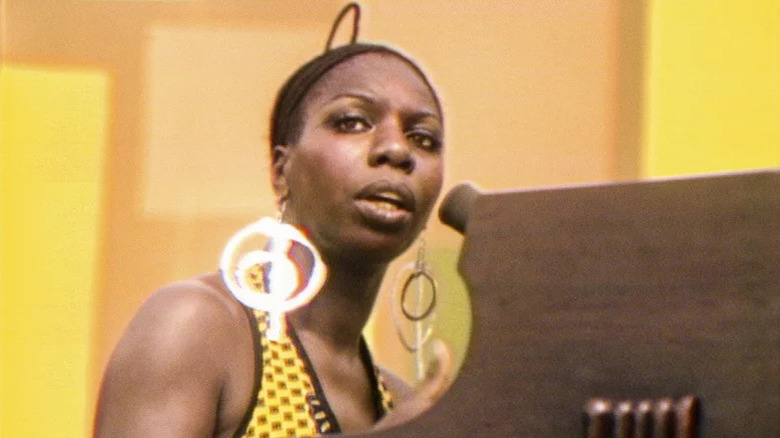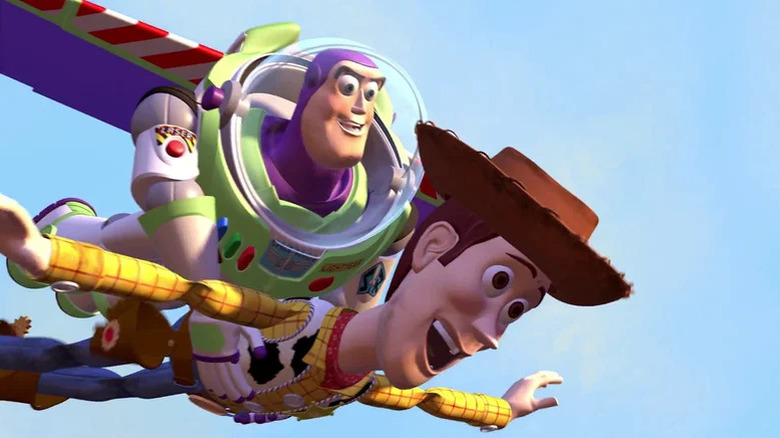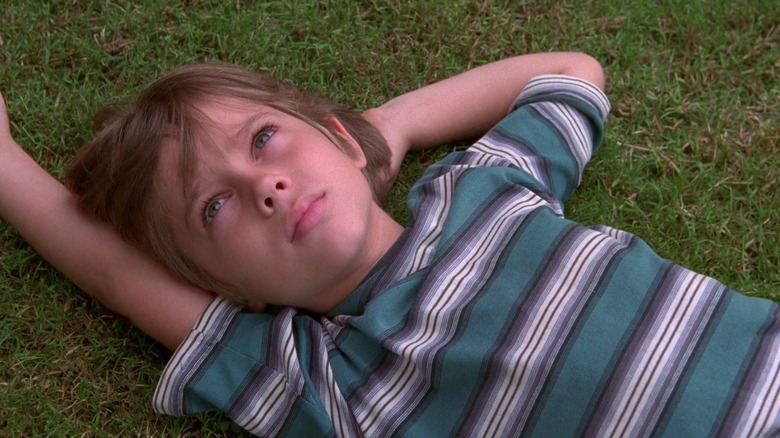10 Best Movies On Disney Plus, According To Rotten Tomatoes
Our unprecedented access to movies doesn't mean the pictures themselves have gotten better. Indeed, when you log on to your favorite streaming service, such as Disney+, you have no way of knowing which films are critically acclaimed and which are veritable flops. Although the platform is most closely associated with content created for kids and families, Disney owns numerous media companies whose content can be streamed there, including Marvel, Pixar, Lucasfilm, ABC, ESPN, FX, and National Geographic. As such, the streaming service hosts more films and television shows than you might have imagined.
But how do you go about finding the cream of the crop, so to speak? One option is to turn to Rotten Tomatoes, the review aggregator that has come to define a film's critical barometer. However, the scores on Rotten Tomatoes aren't as clear-cut as you think. If a movie has a 100% fresh score on the site, that doesn't mean every critic gave the film five stars. Rather, it means that all the tallied critics gave it at least a 6/10. The number of reviews that make up a film's Rotten Tomatoes score also influences the weight of that percentage.
If that all sounds confusing, don't worry — we'll simplify it for you. We analyzed the films streaming on Disney+ by looking at their average critic rating, balanced with the number of reviews they received. This gives us a more detailed view of critical appraisal, which, in turn, can help you decide which movies to watch. Reap the fruits of our labor, and check out the best movies streaming on Disney+, according to Rotten Tomatoes.
Snow White and the Seven Dwarfs
In 1937, Disney released their most important movie. In fact, "Snow White and the Seven Dwarfs" marked a turning point for the company – it was their first full-length film. It was also the first English-language, color animated feature, utilizing the cel animation technique that Disney pioneered. Animators hand-inked every cell, bringing a new level of artistry to the film industry.
While some films that were groundbreaking in their time don't seem like anything special today, that's not the case with "Snow White." Though it's not Disney's greatest film, the animation remains a stunning achievement, and it holds an average rating of 8.8 on Rotten Tomatoes. The rich colors, satisfyingly plump shapes, and beautiful painted backdrops haven't lost their luster, even as animation techniques advanced greatly in the following decades.
It's not the most thrilling of stories, but it set the standard for all Disney princess stories to come, and the narrative feels familiar. We have a kindhearted young woman faced with a personal conflict. She meets a group of eccentric friends and comes to see them as family. Finally, her new community helps her overcome the initial conflict, and she learns what she truly wants.
"Snow White" executes this simple premise beautifully, with charming songs, a delightful score, and the kind of goofy humor Disney fans have come to expect from sidekicks. Though many have criticized the Disney narrative of the prince saving the princess, Snow White has a spunky, optimistic personality that gives her a sense of ambition. Unlike the controversial live-action version of "Snow White," almost everyone agrees that the original is a masterpiece.
All of Us Strangers
Andrew Haigh's "All of Us Strangers" is the kind of film you might be surprised to find on Disney+, considering its adult subject matter. The indie film was produced by Searchlight Pictures, a company owned by Disney, which explains its presence on the platform. Light on plot, the film stars Andrew Scott as Adam, a lonely screenwriter who grows fond of his withdrawn neighbor, Harry (Paul Mescal). As their relationship develops, Adam gets pulled back into his youthful memories. He journeys to his childhood home, finding his parents (played by Clare Foy and Jamie Bell) living there as if it were the day they died 30 years ago. Now all the same age, the trio creates new bonds that never flourished in the past.
"All of Us Strangers" boasts an average review of 8.8 on Rotten Tomatoes, with 274 reviews counted. One's enjoyment of the film rests on one's ability to let go of the need for realism and accept the fantastical nature of the picture without cynicism. A heartfelt, sentimental movie, it explores several aspects of a person's emotional life. Adam continues to struggle with grief, mourning the conversations he never got to have with his parents. Harry is also suffering from a separation from his family of origin, and his scars go deeper than Adam realizes. Together, Adam and Harry find something like love, but is it enough to save them? "All of Us Strangers" won't appeal to every moviegoer, but it will stick with you, whether you buy into its earnest premise or not.
Up
Any new film Pixar releases is pretty much guaranteed to be a hit. Though they're not all universally loved, the majority opinion on the studio's output trends positive. In fact, out of 29 films, only one received a Rotten Tomatoes score lower than 70%: "Cars 2," Pixar's first and only 'rotten' movie. Released in 2009, the Pete Docter-directed "Up" remains one of the most beloved Pixar films, and it holds an average rating of 8.8 on Rotten Tomatoes.
The movie follows Carl Fredricksen (voiced by Ed Asner), a 78-year-old who has lived in the same house for decades. In the opening montage, perhaps the most revered five minutes of any Pixar film, we watch the story of his life. He married his childhood sweetheart, Ellie, and both dreamed of traveling to the South American Paradise Falls in search of their favorite explorer. Ellie had a miscarriage, and the couple learned they couldn't have kids, but life went on. When Carl finally saved up enough money to travel to Paradise Falls, Ellie fell ill and died.
After this sequence concludes, and the audience is left in tears only minutes in, the real meat of the film continues. Now an old widower, Carl plans to travel to Paradise Falls by himself, tying balloons to his house and sailing the skies. A young "wilderness explorer," Russell (Jordan Nagai), hitches a ride. What follows is a funny, heartwarming story about redemption and opening yourself up to happiness. It's hard to argue with that.
Call Me By Your Name
One of the greatest coming-of-age movies in recent memory, the central love story in "Call Me By Your Name" offers a profound lesson for its protagonist. One of director Luca Guadagnino's best films, "Call Me By Your Name" takes place in the 1980s and stars Timothée Chalamet as 17-year-old Elio. On vacation with his sophisticated family in Italy, Elio meets Oliver (Armie Hammer), a graduate student working with his father. They eventually fall into bed together, and the relationship changes Elio's life forever.
Beloved by critics and laypeople alike, "Call Me By Your Name" boasts an average critical rating of 8.8 on Rotten Tomatoes, with an average rating of 4.3 out of 5 from audience members. Though many creative elements compose the film's brilliance, two characteristics stand out: its sumptuous visuals, and the moving performances of its stars. The film was Chalamet's breakout role for a reason: His vulnerable, open performance carries the project. Playing Elio's father, Michael Stuhlbarg performs with great warmth and sensitivity, and his stunning final monologue serves as the film's emotional catharsis.
Sufjan Stevens contributed his talents to the movie, and the soundtrack is as beautiful and delicate as the film itself. Pair that with the tranquil scenery of rural Italy, and you've got a film that arouses all the senses.
Toy Story 3
How often is the third film in a series as highly regarded as "Toy Story 3"? Almost never. In fact, "Toy Story 3" actually has a better average rating on Rotten Tomatoes than "Toy Story 2," with 8.9 versus 8.7. SlashFilm's Joshua Meyer calls "Toy Story 3" Pixar's best movie, while Quentin Tarantino ranked it as his favorite film of 2010. So what makes this little movie so special?
Unlike many other films for children in which the characters rarely age, "Toy Story 3" is no "Peter Pan" fantasy. Indeed, the film's depiction of the passing of time and the bittersweet experience of growing up makes it relatable for all ages. In "Toy Story 3," Andy (John Morris) is on his way to college. No longer interested in playing with kids' stuff, he packs his beloved toys away. Disaster strikes when the box of toys gets mistakenly donated to a daycare center. They encounter the film's creepy villain, a giant, dictatorial bear, and must stage a prison break to escape his clutches.
The toys are in real peril in "Toy Story 3," and the physical and emotional stakes have never been higher. Those born in the 1990s who grew up with "Toy Story" were of a similar age to Andy when "Toy Story 3" came out, giving the movie a profound, tear-inducing resonance for these teens. Parents tend to have strong feelings about their kids growing up and moving out, while kids often yearn for Andy's independence. This emotional story calibrates the sentimentality to the perfect level for every viewer.
Inside Out
When "Inside Out" came out in 2015, showings of the film were attended by sniffling adults all over the country. Like "Toy Story 3," "Inside Out" deals directly with growing up in a way that resonates with audiences of all kinds. With an impressive 8.9 average rating on Rotten Tomatoes, most critics agreed that the film knocked it out of the park.
The movie centers on Riley (Kaitlyn Dias), an 11-year-old girl who loves hockey. When she and her family move from Minnesota to San Francisco, she struggles to deal with the change. The film takes a unique approach to expressing Riley's journey, bringing us inside her head and introducing the five main emotions that drive her behavior: Joy (Amy Poehler), Fear (Bill Hader), Disgust (Mindy Kaling), Anger (Lewis Black), and Sadness (Phyllis Smith). Her emotions are working overtime during this transitional period, and Sadness takes center stage for the first time in Riley's life.
This metaphor does what few other films do: It portrays children as real people with agency, opinions, and rich inner lives. The movie depicts depression beautifully through Sadness, and Bing Bong (Rirchard Kind), Riley's imaginary friend, represents growing up with tragic poignancy. The film's message is one of Pixar's most profound. "Inside Out" reminds us that you need to feel all your emotions to live a full life. You can't push away sadness — it needs to exist as a counterweight to happiness. Teaching kids how to process their emotions within the context of a warm, funny movie feels like a magic trick.
Pinocchio
According to Rotten Tomatoes, the 1940 film "Pinocchio" is the greatest non-Pixar Disney film ever made, holding an average rating of 9.1. Only the second full-length picture released by Disney, "Pinocchio" represents the pinnacle of the company's impressive achievements in animation. Based on Carlo Collodi's 1883 children's novel "The Adventures of Pinocchio," it tells the story of a wooden puppet brought to life by a fairy. Pinocchio (Dickie Jones) was built by Italian woodcarver Geppetto (Christian Rub), and when he's given life, much to Geppetto's delight, he longs to become a real boy.
What follows is a genuinely harrowing adventure interspersed with sweeter moments. In order to become a real boy, Pinocchio travels the land learning what it means to be human. He discovers that humankind can be cruel, selfish, and malicious. Con man Honest John (Walter Catlett) sends him to Stromboli (Charles Judels), a puppet master who buys Pinocchio and locks him in a cage. Later, Honest John convinces Pinocchio to go to Pleasure Island, where young men are turned into donkeys and used for slave labor.
"Pinocchio" balances this terrifying darkness with the innocence that the puppet represents. Pinocchio's high-stakes journey gives the film plenty of dramatic tension, while the final message highlights the power of love to overcome obstacles. The animation is just as compelling as the powerful story, with vivid Technicolor and lovingly painted backdrops. Even in these very early days, the folks at Disney were firing on all cylinders.
Summer of Soul (...Or, When the Revolution Could Not Be Televised)
"Summer of Soul (...Or, When the Revolution Could Not Be Televised)" recounts a story that had been waiting to be told for 50 years. In 1969, the same summer as Woodstock, an equally important musical festival took place. The six-day-long Harlem Cultural Festival featured an amazing lineup of musicians, including Stevie Wonder, Nina Simone, Mahalia Jackson, Gladys Knight & the Pips, Mavis Staples, B.B. King, and Sly and the Family Stone. Though a professional crew filmed the festival, no one wanted to air the footage, hence its near-erasure from history. In 2021, musician Questlove, who won an Oscar for the film, finally introduced us to this long-forgotten event.
Questlove does an admirable job directing the movie, which, in his hands, becomes both a concert film and a history lesson. Though the film centers on the music, Questlove connects the songs to larger social issues faced by black people in Harlem and around the country. Through interviews with musicians, attendees, and experts, the movie touches on the importance of gospel music in the Civil Rights Movement, particularly to the recently murdered Martin Luther King Jr., the canonization of Woodstock vs the Harlem Cultural Festival, and how technical advances like putting a man on the moon did nothing to improve neglected communities of color. A joyous, thought-provoking celebration of black artistry, "Summer of Soul" delighted viewers everywhere, including critics, who gave the film an average rating of 9.1 on Rotten Tomatoes.
Toy Story
As the very first computer-animated feature film, "Toy Story" doesn't highlight the artistry of its creators as much as films like "Snow White" and "Pinocchio" do. But while the groundbreaking nature of its production makes it historically significant, its story and the warmth and humor of its characters make it a great film. The rounded, more three-dimensional design of the creatures within mirrors the film's emotional depth. With a 100% score on Rotten Tomatoes and an average rating of 9.2, "Toy Story" is a near-universally beloved film.
The premise is simple. Woody (Tom Hanks), a cowboy toy, belongs to a young boy named Andy (John Morris). When Andy gets a new toy, Buzz Lightyear (Tim Allen), who thinks he's a real astronaut on a mission, Woody worries Buzz will usurp his place as Andy's favorite toy. The two warring toys mistakenly end up at Andy's neighbor's house, where they face the wrath of the deranged Sid (Erik von Detten). Woody and Buzz must learn to work together to return to Andy before his family moves away.
Much like the film's 3D animation style, every character in the film has shape and depth, from Mr. Potato Head (Don Rickles) to Slinky Dog (Jim Varney). Friendship, as indicated by the familiar song "You've Got a Friend in Me," is one of the main themes of the film, as we're asked to ponder what it means to be a good friend. Such questions never get old, and "Toy Story," despite its now-rudimentary animation style, hasn't aged a day.
Boyhood
Many of the films on this list deal with growing up, but none illuminate these experiences quite like "Boyhood." Director Richard Linklater developed an ambitious strategy for depicting the passage of time: He let the stars age in real time. Filmed over the course of 12 years, "Boyhood" tracks the life of Mason (Ellar Coltrane), from the age of six through his senior year of high school. We also follow his family members, including his sister (Lorelai Linklater) and parents (Ethan Hawke and Patricia Arquette).
Vignettes from each year tell the story of Mason's childhood and adolescence, while music from artists like Coldplay and Arcade Fire captures each time period. (The scene where Mason rides his Razor scooter down the street while "Crank That" by Soulja Boy plays will trigger a sense of deja vu for anyone who grew up in the 2000s.) "Boyhood" shows us the life milestones and everyday mundanity of its characters, with the latter arguably being more impactful.
Ethan Hawke called "Boyhood" a "truly original" film, and its experimental style is, at least initially, its most notable element. But it's more than just a technical and artistic exercise, as the resulting film is as profound as anything you've seen. Seeing the world through the kids' eyes while watching them grow up is a uniquely powerful experience. Both expansive and intimate in scale, "Boyhood" triumphed. While it holds a mere 97% score on Rotten Tomatoes, its average critic score is 9.3, indicating just how much the film affected these reviewers.
